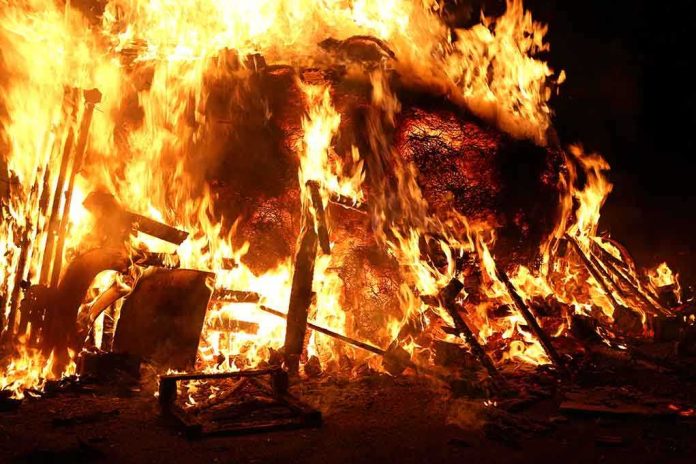
At least 11 elderly residents lost their lives in a devastating fire at a retirement home in Tuzla, Bosnia, highlighting critical challenges in the region’s elderly care system.
Story Snapshot
- Tragic fire at Tuzla retirement home claims at least 11 lives.
- Highlights the vulnerabilities in Bosnia’s elderly care facilities.
- Raises questions about fire safety and infrastructure standards.
- Public outcry and calls for accountability and systemic reforms.
Details of the Tragedy
An overnight fire erupted at a retirement home in Tuzla, northern Bosnia, on November 4, 2025, claiming the lives of at least 11 elderly residents and injuring several others. The blaze, described as one of the deadliest in recent regional history, underscores the vulnerabilities faced by the elderly in care facilities. Drone and ground footage reveal the extensive damage to the facility, prompting urgent calls for a thorough investigation and accountability.
Emergency services responded promptly, but the fire spread rapidly, complicating rescue efforts. The incident has drawn significant attention from both national and international media, focusing on the human toll and the broader implications for elderly care safety standards in Bosnia. As a country grappling with post-war recovery and underfunded social services, this tragedy has amplified ongoing concerns about the adequacy of safety and care in such facilities.
Background and Context
Since the end of the Bosnian War in 1995, Bosnia and Herzegovina has struggled with post-war reconstruction challenges, including underfunded healthcare and elderly care systems. The country’s rapidly aging population has increased the demand for care facilities, many of which operate with outdated infrastructure and insufficient regulatory oversight. This fire, following a history of sporadic safety incidents, highlights systemic issues that demand urgent attention.
The city of Tuzla, known for its industrial past and social activism, is home to the affected retirement facility. The institution is likely underfunded and understaffed, serving residents with limited mobility and health issues. The local community and authorities now face immense pressure to address these systemic challenges and ensure the safety of vulnerable populations in such institutions.
Fire at Retirement Home in Bosnia Kills at Least 11 https://t.co/mBIkK8SJv1 pic.twitter.com/YO9i8g7pYE
— 24 Hours News (@BOTMILEIVLLC) November 5, 2025
Stakeholders and Their Roles
The Bosnian Ministry of Health, responsible for the oversight of healthcare and elderly care facilities, plays a crucial role in investigating the incident and implementing necessary reforms. The Tuzla City Administration manages local governance and emergency response, while emergency services such as firefighters and medical personnel are critical responders in such crises.
The tragedy has also deeply affected the families of the victims, who are seeking justice and accountability. Media coverage is shaping public perception and applying pressure on authorities to take meaningful action. The interplay between these stakeholders will be pivotal in driving policy changes and preventing future incidents.
Current Developments
As of November 5, 2025, authorities confirmed the scale of the tragedy, with investigations into the cause of the fire underway. Survivors are receiving medical care, and public scrutiny is intensifying. The Bosnian Ministry of Health has pledged a thorough investigation, while the Tuzla City Administration emphasizes support for the affected families and preventive measures to avert similar tragedies.
Public outcry has been significant, with protests and vigils planned in Tuzla. The incident has galvanized calls for systemic reforms in elderly care and fire safety standards, reflecting the broader demand for improved public services and accountability in Bosnia.
Sources:
Fire at Retirement Home in Bosnia Kills at Least 11

